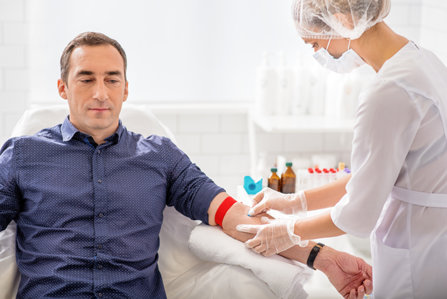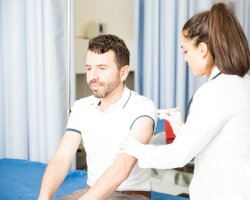What Is the Opioid Vaccine?

Researchers at Columbia University and the University of Minnesota are working on a medication to treat opioid addiction, one that functions much in the same way that vaccines do, hence the nickname “The Opioid Vaccine.” But is this experimental medicine actually a vaccine?
The Opioid Vaccine, Defined
The National Institutes of Health is calling it a “Shot Against Opioids.” And as that title implies, the opioid vaccine is supposed to work much in the same way that a vaccine against infectious diseases and illnesses does. However, the science behind the opioid vaccine is a bit more dubious than that.
The idea behind an opioid vaccine is to create a medication that prevents a specific type of opioid drug addiction from setting in by accomplishing these steps:

1. The vaccine is injected into the bloodstream.
2. Once introduced to the bloodstream, the vaccine would encourage the body to begin producing antibodies against a certain opioid, say oxycodone. (Antibodies are blood proteins the body makes to counteract bacteria, viruses, and other foreign substances, typically substances that cause illnesses or diseases).
3. When the individual later takes oxycodone, the oxycodone-specific antibodies stick to the oxycodone chemicals as they enter the bloodstream, thus preventing them from passing the blood-brain barrier and reaching the brain.
4. So, interfered with, the oxycodone could then produce a euphoric high in the individual or interfere with breathing, thus preventing the pleasant sensations one associates with the drug.
This is how it is “supposed” to function. The evidence that it would prevent addiction and abuse is far from clear-cut. The hypothetical theories behind opioid vaccines have been studied and examined since at least the 1970s, but to date, there are no FDA-approved vaccines designed to treat opioid addiction. However, as of 2023, research has now reached the point of human trials.
Even if it Works, The Opioid Vaccine Faces Significant, Unsolved Problems

Even if the opioid vaccine were to be successful, it would still face some significant problems that researchers have not yet addressed:
1. The opioid vaccine can only be made to target one specific drug at a time because opioid vaccines only work if they are designed with a very specific chemical structure that, in turn, targets a specific chemical structure. For example, an opioid vaccine made to target oxycodone would not work on heroin or fentanyl, meaning a person with an opioid addiction would have to take many, many vaccines at once in order to protect themselves from all opioids.
2. The opioid vaccine cancels out all of the effects of opioids, including opioids’ pain relief properties, meaning patients who’d had an opioid vaccine could not later on take opioids for pain, say following a car accident or major surgery.
3. Best-case scenarios predict the opioid vaccine’s effective duration at a few months, meaning patients would have to receive repeat, scheduled injections indefinitely.
4. Thus far, opioid vaccines seem less effective in immune-compromised patients. Because people with drug addictions often have other infections, illnesses, and altered immune responses, opioid vaccines might not work on a significant percentage of people with an addiction.
While some of the researchers behind the opioid vaccine have expressed optimism about its potential, there is an understanding of the medicine that, even if successful, it will have its limitations.
No Drug is the Answer to Drug Addiction
One of the core deficits of the opioid vaccine is that, even if the drug becomes successful in preventing opioids from having a mind-altering effect on users, the drug will not treat the underlying issues and critical life challenges that lead users to experiment with drugs in the first place. Only qualified, residential drug addiction treatment programs have the tools, resources, know-how, life skills courses, and hands-on healthy coping strategies that struggling addicts can learn and apply to their day-to-day lives.
People with addictions who turn to medicines that may or may not immunize them from the effects of drugs will likely go on to experiment with (and become addicted to) different drugs. And that’s because getting off of drugs for life takes work, dedication, persistence, and overcoming the deeply personal reasons why one turns to drugs as a coping mechanism. No medication will do that for a person with an addiction. Only qualified addiction treatment can.
Sources:
- NIH. “A Shot Against Opioids.” National Institutes of Health, 2023. heal.nih.gov
- GAO. “Opioid Vaccines.” Government Accountability Office: Science, Technology Assessment, and Analytics, 2019. gao.gov


 ®
®